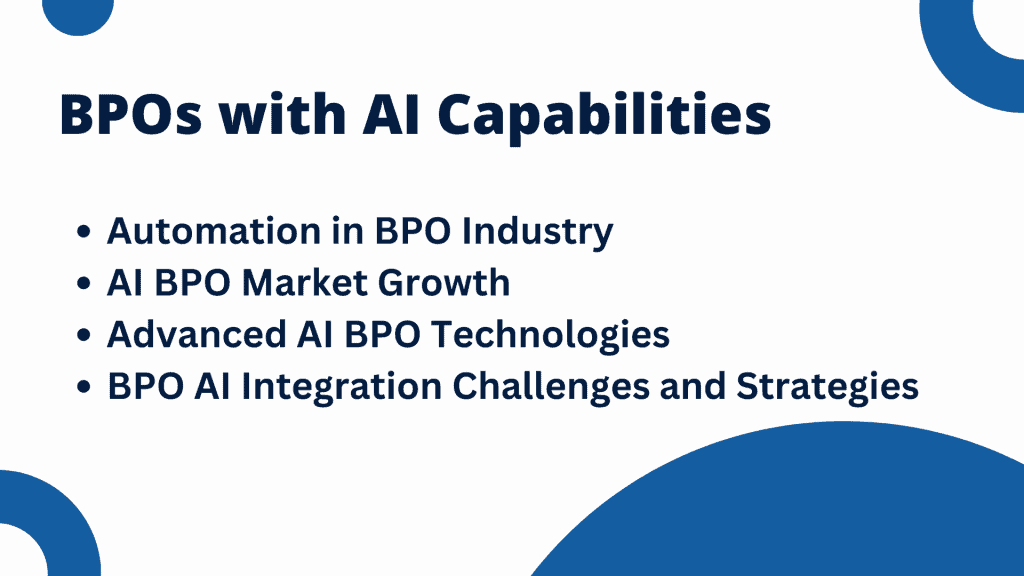In the rapidly evolving world of Business Process Outsourcing (BPO), the integration of Artificial Intelligence (AI) is reshaping the landscape. BPOs with AI capabilities are at the forefront of this transformation, offering innovative solutions to traditional outsourcing challenges. The integration of AI into BPOs is not just a trend; it’s a significant leap towards enhancing operations efficiency, customer service, and overall cost-effectiveness.
AI integration in BPOs is a game-changer. Service providers leveraging AI can automate routine tasks, which translates into faster and more accurate services for their clients. This automation in the BPO industry is not just about replacing human effort but enhancing it. AI-driven BPO services are capable of intelligent decision-making, which elevates the quality of outsourcing solutions provided.
The global trends in the BPO sector indicate a strong shift towards AI adoption. This shift is driven by the need for more efficient, innovative, and cost-effective solutions. AI-powered business process outsourcing is not just about technology advancements; it’s about redefining the entire approach to outsourcing. The industry impact is significant, with AI enabling BPOs to offer more sophisticated services like data analysis, predictive modelling, and personalized customer interactions.
One of the key aspects of BPOs with AI capabilities is their role in enhancing customer service. With AI, service providers can offer more personalized and responsive customer support, which is crucial in today’s competitive market. Operations efficiency is another major benefit. AI integration allows for the streamlining of processes, which leads to faster turnaround times and reduced errors.
BPOs and AI: The Basics
In today’s fast-paced business environment, Business Process Outsourcing (BPO) has become an indispensable strategy for companies looking to streamline operations and focus on core competencies. Outsourcing solutions, particularly in customer service and operations efficiency, allow organizations to delegate non-core tasks to specialized service providers. This approach not only optimizes resource allocation but also enhances overall productivity.
Artificial Intelligence (AI) and Its Key Components
Artificial Intelligence (AI) is reshaping the landscape of various industries through its key components such as machine learning and natural language processing. AI integration in different business processes leads to innovation, increased cost-effectiveness, and significant advancements in technology. AI’s ability to analyze vast amounts of data and automate complex tasks is revolutionizing the way businesses operate.
Transformative Impact of AI on BPOs
BPOs with AI capabilities are at the forefront of this transformation. The integration of AI in BPO services, such as AI-driven BPO services and intelligent outsourcing solutions, has led to a marked improvement in operations efficiency. AI technologies enable BPOs to provide more sophisticated, automated solutions that are not only cost-effective but also highly innovative.
AI-Driven Transformation in Various Industries
Industries worldwide are witnessing a paradigm shift with the adoption of AI in BPO. The AI BPO market growth is primarily driven by the need for efficient and advanced AI BPO technologies. From AI-powered business process outsourcing in the healthcare sector to AI-enhanced operations in finance, the scope of AI’s impact is vast and varied.
Global Trends and Industry Impact
Adoption strategies for BPOs with AI capabilities are influenced by global trends and the ever-evolving nature of technology advancements. The industry impact of AI in BPO is significant, with AI BPO service providers continually developing innovative BPO AI applications that cater to diverse needs.
Solution Implementation and Cost-Effectiveness
Implementing AI-enabled BPO solutions requires a strategic approach that involves understanding the specific needs of a business. The cost-effectiveness of these solutions lies in their ability to streamline processes and automate tasks that traditionally require significant human intervention.
The Convergence of BPOs and AI
Business Process Outsourcing (BPO) has been a pivotal aspect of global business strategies for decades, evolving significantly with technological advancements. The integration of Artificial Intelligence (AI) marks a transformative phase in this evolution. BPOs with AI capabilities are not a futuristic concept but a present reality, reshaping outsourcing solutions. The historical journey from traditional BPO models to AI-enhanced frameworks reflects a commitment to innovation and operational efficiency.
Driving Factors Behind AI Integration in BPOs
Several factors catalyze the fusion of AI in BPOs. Primarily, the relentless pursuit of cost-effectiveness and efficiency in outsourcing solutions has led service providers to embrace AI. Additionally, global trends indicate a surge in demand for intelligent outsourcing solutions, where AI plays a crucial role in automating and streamlining processes. The industry’s trajectory towards AI integration is also influenced by the need to stay competitive in providing customer service and managing operations.
AI Applications in Current BPO Settings
In contemporary BPO settings, AI applications are diverse and impactful. AI-driven BPO services enhance customer service by deploying chatbots and automated response systems, offering immediate, accurate support. Operations efficiency in BPOs is significantly boosted through AI algorithms that optimize workflows and decision-making processes. Furthermore, technology advancements in AI have enabled BPOs to offer innovative solutions, like predictive analytics for strategic planning and natural language processing for improved communication channels.

BPOs with AI Capabilities: A Closer Look
- Automation in BPO Industry: BPOs with AI capabilities leverage automation to handle repetitive tasks, allowing human resources to focus on more complex and creative aspects of business operations. This shift not only elevates efficiency but also propels the industry towards more strategic and innovative roles.
- AI BPO Market Growth: The integration of AI has opened new avenues for market growth in the BPO sector. AI-driven solutions cater to a broader range of industries, demonstrating versatility and adaptability in various business environments.
- Advanced AI BPO Technologies: The spectrum of AI technologies in BPO includes machine learning, data analytics, and robotic process automation (RPA). These technologies have revolutionized traditional BPO services, offering smarter and more efficient outsourcing solutions.
- BPO AI Integration Challenges and Strategies: While the benefits are substantial, integrating AI in BPOs presents challenges such as ensuring data security, managing change in employee roles, and aligning AI solutions with specific business needs. Successful integration involves thoughtful adoption strategies, focusing on training, customization, and gradual implementation.
Impact of AI on BPO Services
The impact of artificial intelligence (AI) on Business Process Outsourcing (BPO) services is a significant and transformative force in the industry. AI integration in BPOs is not just a trend but a strategic evolution that is reshaping how outsourcing solutions are delivered globally.
Enhanced Efficiency and Accuracy in Processes
BPOs with AI capabilities are revolutionizing the traditional models of outsourcing. By integrating advanced AI BPO technologies, these service providers are achieving unparalleled levels of operations efficiency. This integration results in more accurate and faster processing of data, elevating the quality of output and reducing the chances of human error. For instance, AI-powered business process outsourcing can automate repetitive tasks, allowing human resources to focus on more complex and strategic activities. This shift not only enhances productivity but also contributes to cost-effectiveness, a key consideration in any outsourcing solution.
Automated Customer Service and Support
One of the most visible impacts of AI in BPOs is in the realm of customer service. BPOs with AI capabilities are employing intelligent outsourcing solutions like chatbots and virtual assistants. These AI-driven BPO services are not only providing 24/7 support but also offering personalized experiences to customers. For instance, AI in customer service outsourcing is being used to predict customer queries and provide instant, accurate responses. This not only enhances customer satisfaction but also streamlines the workload on customer service agents.
Predictive Analytics for Better Decision-Making
AI BPO market growth is also driven by the adoption of predictive analytics. BPOs with AI capabilities use these analytics for better decision-making and strategic planning. By analyzing large sets of data, AI-enabled BPO solutions can forecast trends, consumer behaviors, and potential risks. This foresight allows BPOs and their clients to make informed decisions, stay ahead of global trends, and embrace innovative BPO AI applications proactively.
Challenges and Considerations
In the realm of Business Process Outsourcing (BPO), the integration of Artificial Intelligence (AI) is not just a trend, but a significant shift in operational strategies. As BPOs with AI capabilities continue to evolve, they offer a myriad of benefits, including enhanced customer service, operations efficiency, and cost-effectiveness. However, adopting these advanced technologies is not without its challenges and considerations.
Technical and Operational Challenges in Integrating AI
The integration of AI into BPOs presents several technical and operational challenges.
Firstly, the adoption of AI and automation technologies demands substantial investment in Technology Advancements. BPOs with AI capabilities must ensure their infrastructure can support these advanced AI BPO technologies.
Another critical aspect is the AI BPO market growth, which necessitates constant innovation and adoption strategies to stay competitive. BPO AI integration involves not only the adoption of new technologies but also the transformation of existing processes to ensure efficient AI BPO strategies.
Ethical Considerations and Data Privacy Concerns
Ethical considerations in AI-driven BPO services are paramount. Intelligent outsourcing solutions must respect data privacy and comply with global regulations. BPOs with AI capabilities face the challenge of balancing operational efficiency with ethical considerations. AI in customer service outsourcing, for instance, must ensure that personal data is handled responsibly, aligning with global AI BPO trends and ethical standards.
The Need for Skilled Workforce and Continuous Learning
The integration of AI in BPOs necessitates a skilled workforce. Employees must be trained in AI-powered business process outsourcing and innovative BPO AI applications. The industry is experiencing a shift, with AI BPO service providers requiring continuous learning and upskilling to adapt to AI BPO transformation. This transition impacts the roles within BPO AI service providers, emphasizing the need for a workforce capable of managing AI technology in BPO.
Integration with Current Trends and Practices
BPOs with AI capabilities must align with current global trends and practices. The future of AI in BPO is shaped by how well these organizations adapt to AI-enhanced BPO operations and BPO AI advancements. Cost-effective AI BPO solutions are a key consideration, with firms focusing on innovation and industry impact. Solution implementation in BPOs with AI capabilities involves understanding the global AI BPO trends and adopting best practices for AI BPO client experiences.
Conclusion
In the evolving landscape of Business Process Outsourcing (BPO), the integration of Artificial Intelligence (AI) is not just a trend, but a significant leap forward. BPOs with AI capabilities are redefining the industry, offering intelligent outsourcing solutions and unparalleled operations efficiency.
AI Integration in BPOs has ushered in a new era of cost-effectiveness and innovation. With AI, service providers can analyze vast amounts of data, leading to more informed decisions and technology advancements. This transformation is evident in areas like customer service, where AI-driven interactions ensure consistency and personalization, enhancing the overall customer experience.
The industry impact of AI in BPOs is profound. It’s not just about automating tasks, but also about enriching the decision-making process and offering outsourcing solutions that are both efficient and effective. For instance, AI-enabled BPO solutions in customer service can predict and solve issues before they escalate, ensuring a higher level of customer satisfaction.
One key aspect of adopting AI in BPOs is solution implementation. AI-powered business process outsourcing requires a strategic approach, where adoption strategies are tailored to meet the specific needs of a business. This might include training existing employees or hiring new talent skilled in AI technologies.
The global trends show a clear shift towards AI in the BPO sector. AI BPO market growth is driven by the need for businesses to stay competitive in a rapidly changing digital landscape. AI in customer service outsourcing is just one example of how AI is revolutionizing the industry.
FAQs
What is AI in BPO?
AI in BPO refers to the integration of Artificial Intelligence technologies in Business Process Outsourcing. It involves using AI tools and algorithms to automate and optimize various processes within BPO services, such as customer service, data processing, and analysis. AI enhances the efficiency, accuracy, and speed of BPO operations.
How does AI enhance BPO services?
AI enhances BPO services by automating routine tasks, providing data-driven insights, and improving decision-making processes. It enables faster processing of large volumes of data, offers personalized customer interactions, and reduces operational costs. AI tools like chatbots and intelligent automation systems also help in providing 24/7 customer service.
What are the benefits of using AI in BPO?
The benefits of using AI in BPO include increased operational efficiency, cost reduction, improved customer satisfaction, and enhanced accuracy in data processing. AI enables handling of high-volume tasks with greater speed and fewer errors. It also provides valuable insights from data analytics, leading to better business decisions.
Are there risks associated with AI in BPO?
Yes, there are risks associated with AI in BPO. These include potential job displacement due to automation, data privacy concerns, and the possibility of AI systems making errors or biases if not properly trained or monitored. It’s crucial for organizations to address these risks by ensuring ethical AI practices and maintaining a balance between automation and human oversight.
How is AI transforming the BPO industry?
AI is transforming the BPO industry by automating routine tasks, enabling more complex and higher-value services, and improving customer experiences. It allows BPOs to offer more sophisticated services like intelligent customer support and advanced data analytics. This transformation leads to higher productivity and the ability to meet evolving customer demands.
Can small businesses benefit from AI in BPO?
Yes, small businesses can benefit from AI in BPO. AI tools can help small businesses streamline operations, reduce costs, and improve customer service, even with limited resources. By outsourcing AI-enabled services, small businesses can access advanced technologies and expertise that might otherwise be unaffordable or complex to implement in-house.
What is the cost of implementing AI in BPO?
The cost of implementing AI in BPO varies depending on the scope, complexity, and scale of the AI solutions being adopted. Factors include the cost of AI software or platforms, integration with existing systems, training for employees, and ongoing maintenance. While initial costs can be significant, the long-term savings and efficiency gains often justify the investment.
How does AI improve customer service in BPO?
AI improves customer service in BPO by providing quick, consistent, and personalized responses to customer inquiries. AI-powered chatbots and virtual assistants can handle a large volume of queries simultaneously, reducing wait times. They also use customer data to provide tailored recommendations and solutions, enhancing the overall customer experience.
What are the future trends of AI in BPO?
Future trends of AI in BPO include increased use of machine learning for predictive analytics, deeper integration of AI with other emerging technologies like IoT and blockchain, and the development of more sophisticated natural language processing for better customer interactions. Additionally, there will be a focus on ethical AI and ensuring transparency and fairness in AI-driven processes.
How does AI impact employment in the BPO sector?
AI impacts employment in the BPO sector by automating routine tasks, which can lead to job displacement. However, it also creates new job opportunities requiring more advanced skills in AI management and analysis. The focus shifts towards more value-added services, requiring employees to upskill and adapt to the evolving technological landscape.






